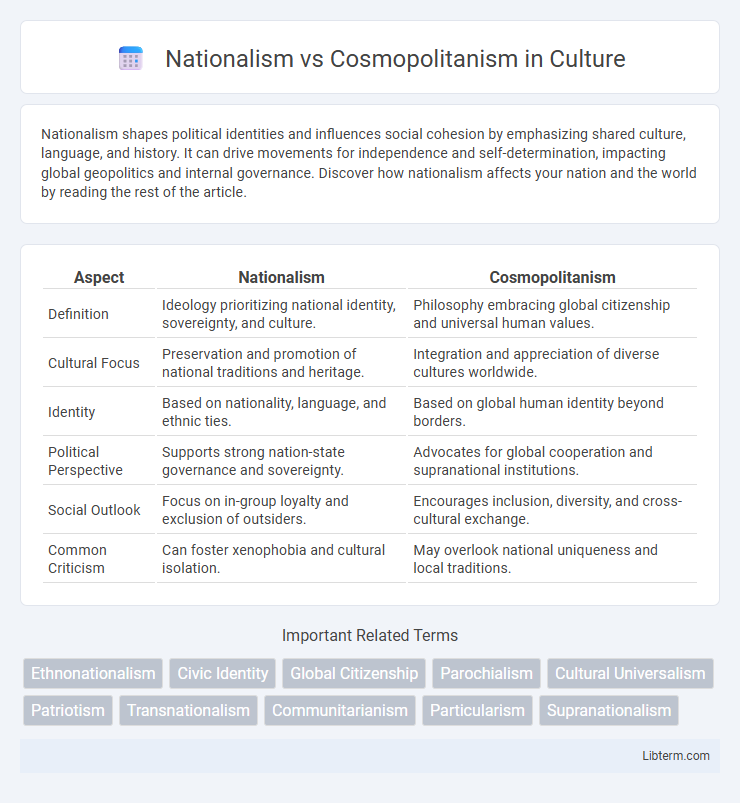Nationalism shapes political identities and influences social cohesion by emphasizing shared culture, language, and history. It can drive movements for independence and self-determination, impacting global geopolitics and internal governance. Discover how nationalism affects your nation and the world by reading the rest of the article.
Table of Comparison
| Aspect | Nationalism | Cosmopolitanism |
|---|---|---|
| Definition | Ideology prioritizing national identity, sovereignty, and culture. | Philosophy embracing global citizenship and universal human values. |
| Cultural Focus | Preservation and promotion of national traditions and heritage. | Integration and appreciation of diverse cultures worldwide. |
| Identity | Based on nationality, language, and ethnic ties. | Based on global human identity beyond borders. |
| Political Perspective | Supports strong nation-state governance and sovereignty. | Advocates for global cooperation and supranational institutions. |
| Social Outlook | Focus on in-group loyalty and exclusion of outsiders. | Encourages inclusion, diversity, and cross-cultural exchange. |
| Common Criticism | Can foster xenophobia and cultural isolation. | May overlook national uniqueness and local traditions. |
Defining Nationalism: Concepts and Core Principles
Nationalism is a political ideology centered on the promotion of a shared national identity, emphasizing sovereignty, cultural heritage, and territorial integrity. Core principles include self-determination, prioritization of national interests, and collective unity based on ethnicity, language, or historical experience. This ideology often asserts the importance of maintaining distinct national boundaries and cultural traditions in opposition to external influences.
Understanding Cosmopolitanism: Ideals and Values
Cosmopolitanism emphasizes global citizenship, advocating for the recognition of shared human rights and cultural diversity beyond national boundaries. It promotes values such as inclusivity, mutual respect, and ethical responsibility toward all individuals regardless of their nationality. This ideology encourages cooperation, dialogue, and the pursuit of justice on a worldwide scale, fostering interconnectedness in an increasingly globalized society.
Historical Roots of Nationalism and Cosmopolitanism
Nationalism emerged in the 18th and 19th centuries as a political ideology emphasizing the sovereign authority of the nation-state and a shared cultural identity, often rooted in language, ethnicity, and historical experiences. Cosmopolitanism traces its origins to ancient Stoic philosophy and Enlightenment thinkers, advocating for global citizenship and moral obligations beyond national borders. The historical roots of nationalism and cosmopolitanism reflect contrasting views on identity and allegiance, with nationalism prioritizing territorial and cultural unity while cosmopolitanism promotes universal human values and interconnectedness.
Cultural Identity: Local Belonging vs Global Citizenship
Nationalism emphasizes cultural identity rooted in local traditions, language, and heritage, fostering a strong sense of belonging to a specific nation-state. Cosmopolitanism advocates for global citizenship, promoting cultural diversity, mutual respect, and shared human values beyond geographic boundaries. The tension between local belonging and global identity shapes debates on cultural preservation, social cohesion, and inclusive governance in an interconnected world.
Political Implications: Governance in a Divided World
Nationalism shapes governance by prioritizing state sovereignty, emphasizing border control, and promoting policies favoring national identity, which can lead to insular decision-making and reduced international cooperation. Cosmopolitanism advocates for global governance frameworks, encouraging transnational collaboration and inclusive policymaking that transcends national boundaries, aiming to address global challenges such as climate change and migration. The political tension between these paradigms influences international institutions, affects treaty negotiations, and impacts the stability of multilateral agreements in an increasingly interconnected yet divided world.
Economic Perspectives: Protectionism vs Global Integration
Nationalism emphasizes economic protectionism, advocating for tariffs, trade barriers, and policies that prioritize domestic industries to safeguard national employment and sovereignty. Cosmopolitanism supports global integration, promoting free trade, cross-border investment, and multinational cooperation to enhance economic growth and innovation. Empirical studies show protectionism can limit market efficiency and increase consumer costs, while economic integration typically drives GDP growth, technological diffusion, and competitive advantage on a global scale.
National Sovereignty and International Cooperation
National sovereignty emphasizes a country's independent authority to govern without external interference, preserving cultural identity and political autonomy. Cosmopolitanism promotes international cooperation through global governance institutions, encouraging shared values and collective problem-solving across borders. Balancing national sovereignty with international collaboration remains crucial for addressing global challenges while respecting state independence.
Social Cohesion: Unity Within Borders vs Universal Solidarity
Nationalism fosters social cohesion by promoting unity within national borders, emphasizing shared history, culture, and values that strengthen collective identity. Cosmopolitanism advocates universal solidarity, encouraging individuals to transcend local affiliations and embrace global citizenship based on common humanity and ethical responsibility. The tension between these paradigms shapes policies on immigration, multiculturalism, and international cooperation, influencing social harmony and inclusion.
Challenges in a Globalized Era: Migration, Technology, and Conflict
Nationalism and cosmopolitanism face significant challenges in a globalized era characterized by increased migration, rapid technological advancements, and persistent conflicts. Migration intensifies debates over national identity and sovereignty, while technology facilitates cross-border communication yet also amplifies misinformation and cultural clashes. Conflicts arising from economic inequalities and political polarization further complicate efforts to reconcile nationalist priorities with cosmopolitan ideals of global cooperation and inclusivity.
The Future: Balancing National Interests with Global Responsibilities
Balancing national interests with global responsibilities requires embracing a pragmatic approach that harmonizes sovereignty with international cooperation. Future governance models must prioritize sustainable development, climate action, and equitable resource distribution to address transnational challenges effectively. Integrating cultural diversity and shared human values can foster collaborative policies, ensuring that nationalism does not hinder global progress.
Nationalism Infographic

 libterm.com
libterm.com